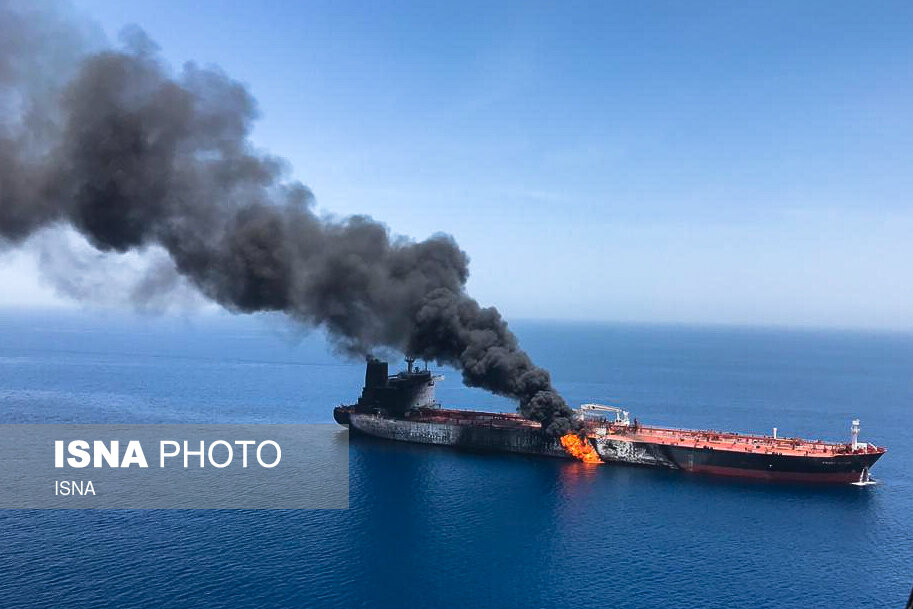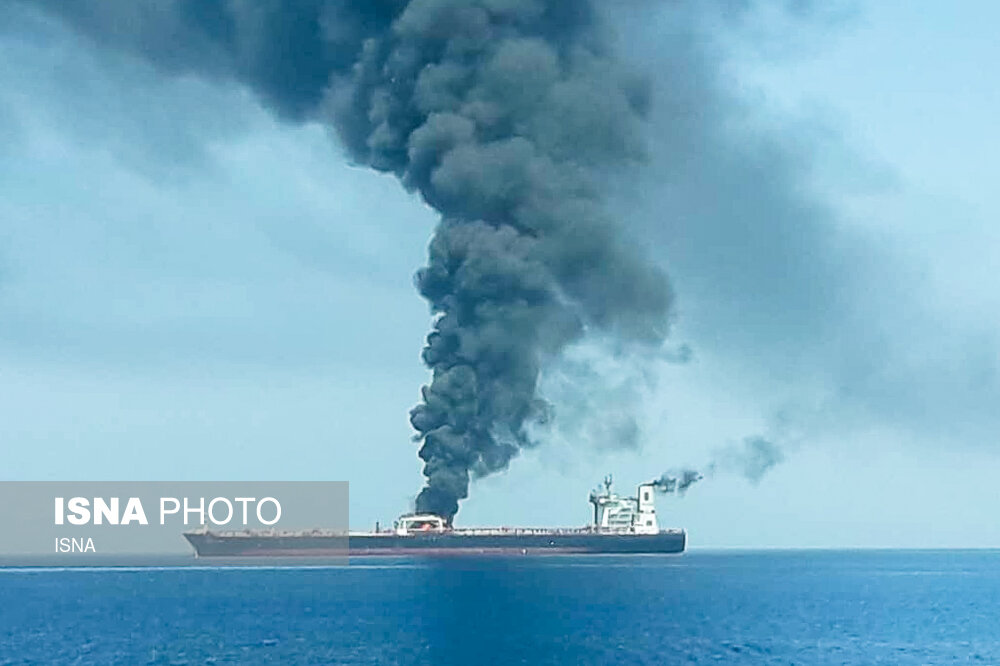By Wu Jian
Two supertankers were attacked in the Gulf of Oman near the Strait of Hormuz on June 13. Worryingly, the US Central Command and the Iranian Revolutionary Guard Corps, who labeled each other as “terrorist organization” two months ago, have engaged in confrontation.
According to the implication of the US Central Command, the Iranian Revolutionary Guard Corps should be responsible for the attack. However, Iran has denied from the outset any involvement and accused the US of initiating the trouble intentionally, leading to the crisis in the Middle East. No matter how the supertanker event progressed, its essence is the safety risk spillover effect generated by the US “extreme pressure” on Iran. The US’ current strategies towards Iran mainly include the following three aspects:

Firstly, imposing economic pressure. Since November 2018, Washington has fully implemented the comprehensive sanctions against Iran, forcing major global business groups to make choices whether to carry on investing in Iran or to have more access to the US financial market. Teheran has tried to relieve the bad impact but with no definite effect. For example, according to the latest report made by the US Department of State, more than 50 major global companies are preparing to pull out of Iran.
In addition, the exchange rate of the Iranian Rial to USD recently hit a new record low. However, for the long-suffering Iranian people, the situation probably would be further deteriorated. Iranian officers are discussing whether to reintroduce food rations during the Iran-Iraq War in 1980s.
Secondly, expanding the scope. In order to reach the nuclear agreement, Obama Administration was cautious to avoid excessive influences on life of the public in Iran. However, the Trump team imposed the Iranian public with tougher economic sanctions, in order to intensify the internal contradictions of the Islamic Republic.
As Pompeo put it, “While it is ultimately up to the Iranian people to determine the direction of their country, the United States, in the spirit of our own freedoms, will support the long-ignored voice of the Iranian people.”
Thirdly, strengthening security. Washington is strengthening the closer relationship with regional opponents of Iran. At present, the America is urging Arab countries to establish their own “NATO”, temporarily known as the Middle East Strategic Alliance (MESA), which includes countries like Saudi Arabia, Jordan and Egypt, and has the US’ support.
Evidently the NATO was an important tool to contain the Soviet Union during the Cold War; similarly, the Middle East Strategic Alliance will be projected to counter Iran’s influence in the Middle East, when Iran has essentially controlled Syria, Iraq, Lebanon and Yemen, directly or through proxy forces.
According to a spokesman of National Security Council, such an alliance should act as a bastion of Iranian “aggression, terrorism and extremism”, and hopefully it will “lead to a steady situation for the Middle East in the future”.

If it is effectively implemented, the three-part strategy might weaken Teheran’s strength at home and impose more restrictions abroad. Under such circumstances, would Teheran surrender?
Sociology Professor Misagh Parsa, author of Democracy in Iran: Why It Failed and How It Might Succeed, pointed out that the secret for the success of the Iranian Revolution in Iran 40 years ago was that the poor at the bottom of society were mobilized to overthrow the richest Pahlavi dynasty. In the same way, in order to overthrow the Islamic Republic, these poor and disposed people will be the key to success.
Due to the new sanctions imposed from last November, the Iranian social unrest has increased which was shown in various aspects, such as workers getting no pay, peasants hit by drought and retirees received no allowance, etc.
The automobile industry with the largest number of hired labor in Iran was hit harder since the sanctions. Although the assembly lines are still operating, workers have no work to do because of insufficient raw materials. A lot of automobiles are delivered as semi-finished products, which cannot be sold, and thousands of stacked automobiles by SAIPA Group, an Iranian state-owned company, were recorded by a US satellite. Just as what was pointed by Soheila, a councilwoman of Iran: “Trump tries to push Iran into a corner.”
However, on the other hand, although there are large numbers of movements against Iran, which are expected by US sanctions, they fail to have unified forms and appeals. In addition, most demonstrations have not questioned the legitimacy of the Islamic Republic. Just as what was pointed by Soheila, Iran people regard their motherland as the “peace island” in the Middle East since the turmoil in 2011. After all, the chaos caused by wars in other Arab countries are more terrifying, most of which are related to the US.
In fact, the US and Iran are in a “protracted war for sanction”. Just as what an Emirati scholar pointed out, Iran intends to wait until Trump steps down from the stage while improving its tenacity and adopting other measures to boost its economic, political or even military influences in the Middle East at the same time, to restrain the US, and dig holes on the “sanction wall” erected by the US.
Interestingly, the new sanction policy adopted by the US seems to strengthen the position of Iran’s hardliners, who refuse to make a dialogue to Washington but prepares for the conflict. It is important to know that the Iranian Revolutionary Guard Corps is connected with the Iranian people. The expectation of “let the sanctions push Iran into self-detonation” by the US might only lead to a more difficult situation for the US and its allies to handle.
Disclaimer: This article is originally published on Xinmin News Net, one of the biggest mainstream news network based in Shanghai City. It is translated from Chinese into English and edited by the China Military Online. The information, ideas or opinions appearing in this article do not reflect the views of eng.chinamil.com.cn.













